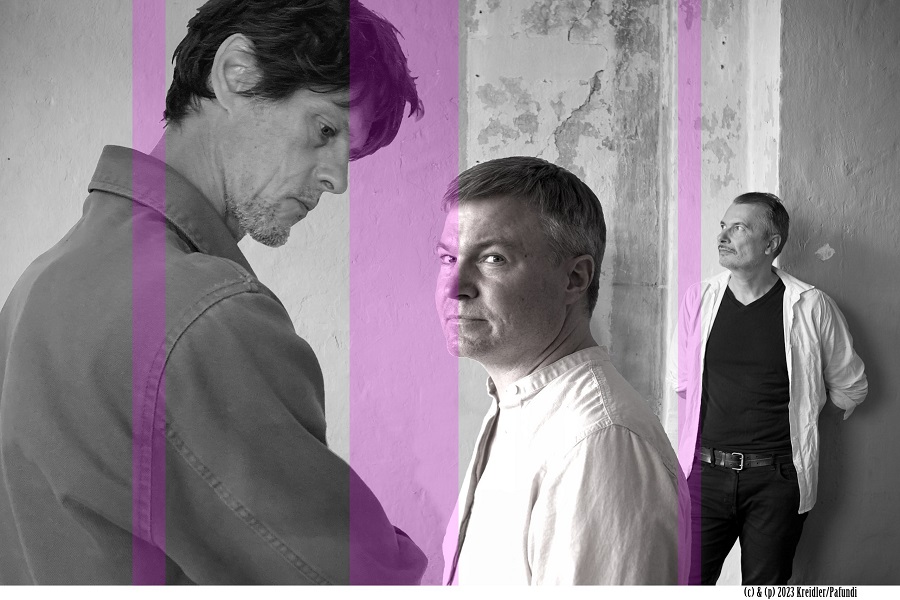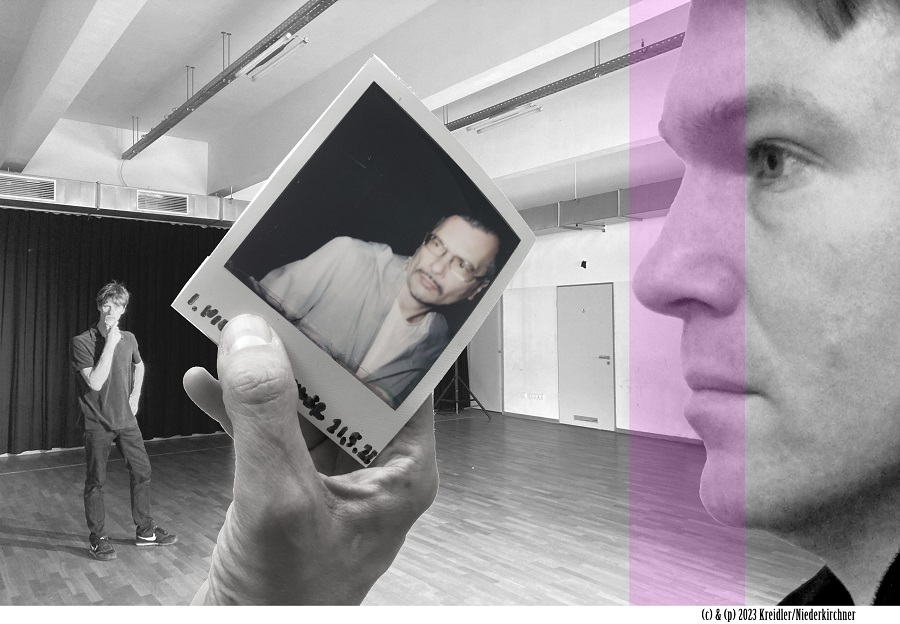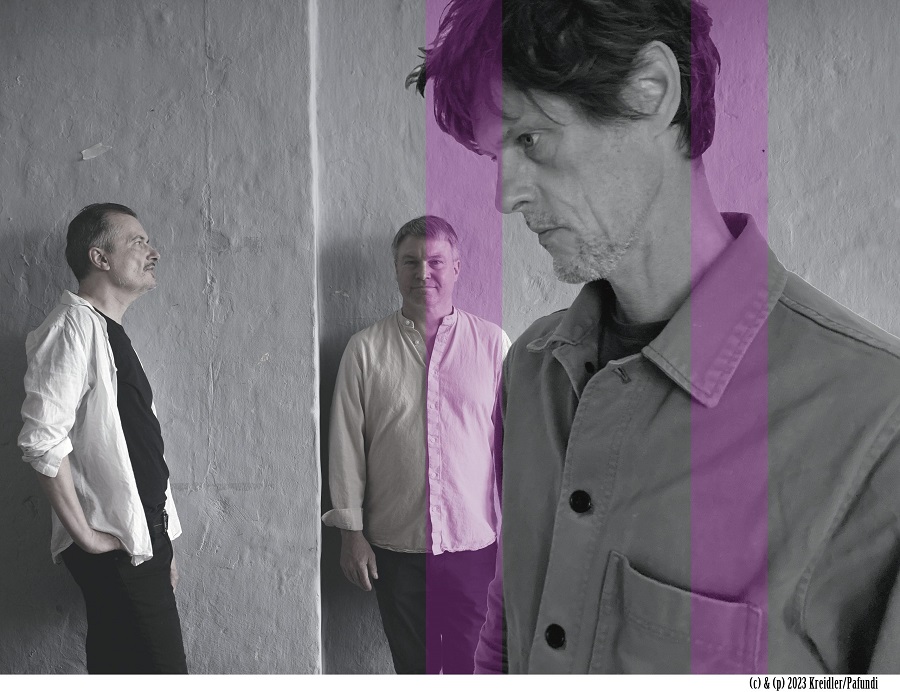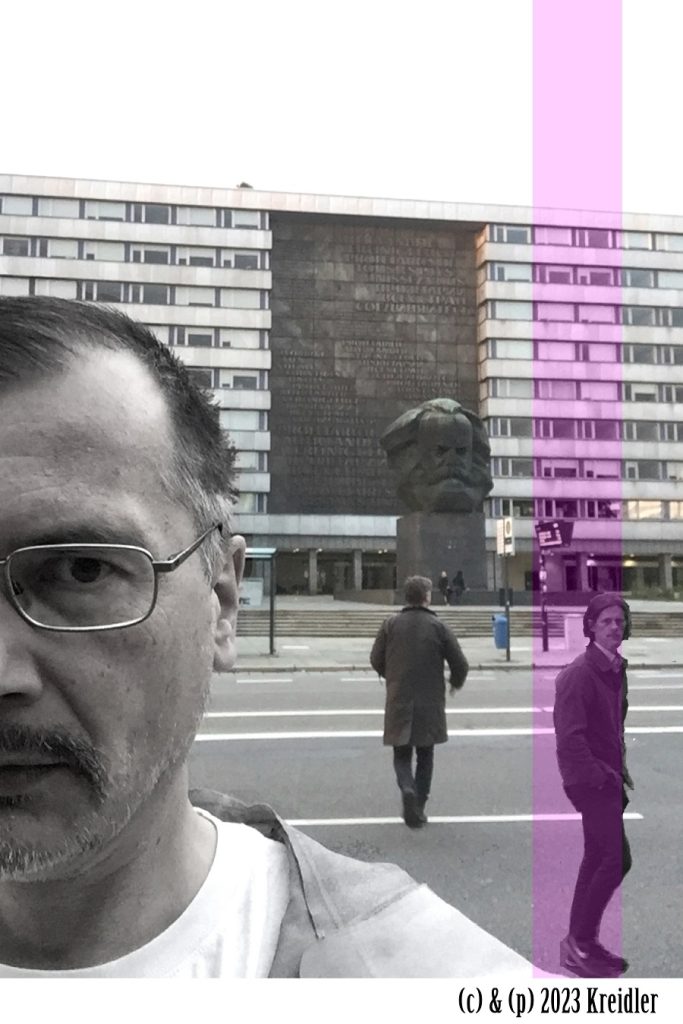
There are bands you may have never heard of, but who have been leaving an indelible impression on the musical landscape for decades. Kreidler is such a band. The German-Berlin formation, founded in 1994, has played all the important venues over the years.
When their new album “Twists (A Visitor Arrives)” was released earlier this year, the editors at Maxazine were immediately impressed. The album received a 9 – a rating we rarely give and which is reserved only for albums that rise above the ordinary. This score is even more remarkable because tens at Maxazine are reserved for albums that have proven their masterful status over the years. Reason enough to have a Zoom conversation with Alex Paulick and Andreas Reihse, shortly after their memorable concert at FFT in Düsseldorf.

‘That 9 for “Twists” was a nice surprise,’ Andreas Reihse smiles through the screen. ‘But the funny thing is that many people still see us as an experimental electronic studio band, while it’s the organic foundation of drums, bass, and synthesizers that defines us.’
Alex Paulick, whose basslines form the backbone of Kreidler’s distinctive sound, nods in agreement. ‘That groove, which you hear throughout our work, comes from the fact that we are essentially a band that plays together. Without that live dynamic, Kreidler could never sound the way it does.’
‘Take a track like “Arithmetrique”,’ Reihse adds. ‘Like much of our material, it emerged from a kind of guided jam in the studio. We work within a pre-conceived framework of shifting rhythmic patterns, but the magic happens in the interplay.’ He explains how the band explores every idea in detail, refining it until everything falls into place.
‘It’s a misconception that we’re an electronic band that uses some instruments,’ Paulick emphasizes. ‘It’s exactly the opposite: we’re a band that integrates electronic elements into a living, breathing whole. Kreidler: The human factor in a digital age. That’s why people appreciate us – that combination of a solid groove with electronic textures.’

This approach has led to “Twists” being one of their most accessible, yet also most layered albums. It’s a record that shows experimental music doesn’t have to come at the expense of the physical impact that a good rhythm section can have.
The conversation about Kreidler’s core brings Alex Paulick back to his first days with the band. ‘I remember walking into a rehearsal space without screens. Just instruments, amplifiers, and a few effect pedals. That directness had something pure about it.’ He smiles at the memory. ‘Now there are laptops too, of course, but we try to maintain that balance between the analogue and digital.’
‘What really concerns me,’ Paulick continues, his voice taking on an intensity that’s palpable even via Zoom, ‘is that there are now more than 9000 tracks appearing weekly on streaming platforms that are entirely generated by AI. Without human intervention, without soul.’ He lets his words sink in. ‘We’re not talking about a theoretical future – this is happening now.’
It clearly strikes a sensitive chord with the bassist. ‘The problem runs much deeper than people realize. AI works with algorithms based on analyses of large amounts of data. What comes out are, by definition, risk-free averages – a kind of musical lowest common denominator.’ His frustration is palpable as he continues: ‘But art, real art, emerges from the edges, from taking risks, from daring to fail.’
Reihse nods in agreement. ‘Look at the history of electronic music. Kraftwerk, NEU!, all those pioneers – they made music that no one had heard before. They created something new by pushing boundaries, by experimenting. AI can’t do that. It can only reproduce what already exists, calculate averages of what has already been made.’
‘It’s a form of cultural erosion,’ Paulick adds, now visibly emotional. ‘Every AI-generated track that gets streamed takes the place of music that emerged from human experience, from real emotion, from life itself. The level of music isn’t declining because AI makes bad music – it’s declining because AI produces perfect mediocrity.’
The Essentials playlist that Kreidler compiled for Spotify is a surprisingly intimate journey through their musical memory. ‘The fascinating thing was,’ Reihse says, searching for the right words, ‘how during the compilation we were confronted with our orphans – tracks like “Ceramic” and “Evil Love” that had been pushed to the background in our collective memory.’

‘It was like opening an old photo album,’ Paulick indicates. ‘Every track we heard again brought a wave of memories – not just of making the music, but of the emotions, the personal stories that are woven into every chord, every bassline.’ He smiles. ‘It’s precisely those songs you had almost forgotten that suddenly shine the brightest.’
The list thus became much more than a collection of ‘best’ tracks. ‘It became a kind of musical autobiography,’ Reihse confesses. ‘Tracks that might not be our most famous ones, but that perfectly capture the spirit of Kreidler – that constant search for balance between experiment and feeling, between the conceived and the felt.’
As the conversation turns to the future, to what comes after “Twists”, the answer becomes as natural as their music itself. ‘We’re actually always experimenting, always recording,’ says Reihse. ‘It’s like planting musical seeds – some germinate immediately, others need years to bloom.’
‘There are always experiments,’ Paulick admits, ‘but the difference between an experiment and a concept is like between a sketch and a painting. You feel when something wants to become more.’ He smiles enigmatically. ‘With Kreidler, you never know if the next album will be in 2026 or not until 2062.’
A mixture of resignation and determination resonates as Reihse and Paulick reflect on their position in today’s musical landscape. ‘We’re very much aware that a band like Kreidler will increasingly drift away from the mainstream,’ says Reihse. ‘In an ocean of commercial and AI-generated music, we’re a small ship charting its own course.’
‘But that’s okay,’ Paulick adds. ‘We’ll keep making music as long as we feel it matters – for ourselves, and for the people who still make the effort to come listen, to visit our concerts.’ He smiles. ‘In a way, that’s always been our position – swimming against the current, making music that doesn’t fit within the lines.’
The hope to return to stages soon is there, but like everything with Kreidler, it happens when the time is right. In a world that spins ever faster and becomes increasingly automated, Kreidler remains a beacon of humanity—proof that real innovation still comes from the chemistry between people who dare to search for the unknown.

